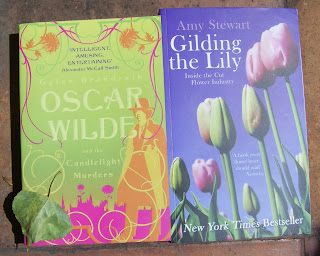
Orchids seem to bring out the wackiness within. Who knew? Not me. I thought they were pretty plants who usually die despite my best efforts, or whose flowers smell like carrion like a specimen I was once presented with (thanks.).
Turns out there’s a whole orchid “sub-culture” out there – where nurseries are patrolled by armed security and people get into fist-fights over bulbs. (Two things that are usually found in close proximity to orchids I found, both through reading “Orchid Fever” and a spot of internet research are guns and reptiles. Go figure.)
Now, I had already read “Tulipmania” which is often mentioned in reviews of Hansen’s book, but let me tell you those sixteenth-century tulip lovers didn’t have anything on these guys and gals.
However, Hansen delivers a double-whammy with “Orchid Fever”: it’s not just about the orchids and human eccentricity, the things we hold as valuable and what we’ll do to get them; Hansen also constructs here a very powerful condemnation of CITES (Convention on International Trade in Endangered Species) policies which, in the best case scenario, are not doing much to protect endangered species, and in the worst case, are building a corrupt network of officials, lead by ignorant lawyers who as one character puts it “don’t know a blade of grass from an orchid” – with this ignorance extending to many other species, both animal and plant, one imagines.(And to think orchids are actually their logo. Crazy.)
It’s not the first criticism of CITES I’ve read, but certainly the most powerful because Hansen merely needs to tell his subject’s encounters with Convention officials for it to become apparent that this organization is a nest of rabid bureaucrats with little idea of what’s going on with the species they are ‘protecting’. Certainly CITES is only concerned with ‘trade’ which means that, if you witness deforestation in Borneo, for instance, and grab a couple of plants listed on Appendix I to save and/or try to take them across borders – you are getting fined, big time and maybe even arrested. Meanwhile does anyone care about the fate of the animals and plants, losing their habitats? Not CITES. They’ve got their officials making the rounds at every major airport/port. If that’s supposed to keep species from going extinct, God help us all.
“Orchid Fever” is a great book, filled with impossible characters (seriously, if you read about these people in a work of fiction, you’d be like ‘That’s soo far-fetched). It made my eyes pop in astonishment but it also got me angry. So c’mon people, who’s gonna write me a CITES exposé? I’ll be first in line to buy that sucker.
Turns out there’s a whole orchid “sub-culture” out there – where nurseries are patrolled by armed security and people get into fist-fights over bulbs. (Two things that are usually found in close proximity to orchids I found, both through reading “Orchid Fever” and a spot of internet research are guns and reptiles. Go figure.)
Now, I had already read “Tulipmania” which is often mentioned in reviews of Hansen’s book, but let me tell you those sixteenth-century tulip lovers didn’t have anything on these guys and gals.
However, Hansen delivers a double-whammy with “Orchid Fever”: it’s not just about the orchids and human eccentricity, the things we hold as valuable and what we’ll do to get them; Hansen also constructs here a very powerful condemnation of CITES (Convention on International Trade in Endangered Species) policies which, in the best case scenario, are not doing much to protect endangered species, and in the worst case, are building a corrupt network of officials, lead by ignorant lawyers who as one character puts it “don’t know a blade of grass from an orchid” – with this ignorance extending to many other species, both animal and plant, one imagines.(And to think orchids are actually their logo. Crazy.)
It’s not the first criticism of CITES I’ve read, but certainly the most powerful because Hansen merely needs to tell his subject’s encounters with Convention officials for it to become apparent that this organization is a nest of rabid bureaucrats with little idea of what’s going on with the species they are ‘protecting’. Certainly CITES is only concerned with ‘trade’ which means that, if you witness deforestation in Borneo, for instance, and grab a couple of plants listed on Appendix I to save and/or try to take them across borders – you are getting fined, big time and maybe even arrested. Meanwhile does anyone care about the fate of the animals and plants, losing their habitats? Not CITES. They’ve got their officials making the rounds at every major airport/port. If that’s supposed to keep species from going extinct, God help us all.
“Orchid Fever” is a great book, filled with impossible characters (seriously, if you read about these people in a work of fiction, you’d be like ‘That’s soo far-fetched). It made my eyes pop in astonishment but it also got me angry. So c’mon people, who’s gonna write me a CITES exposé? I’ll be first in line to buy that sucker.



